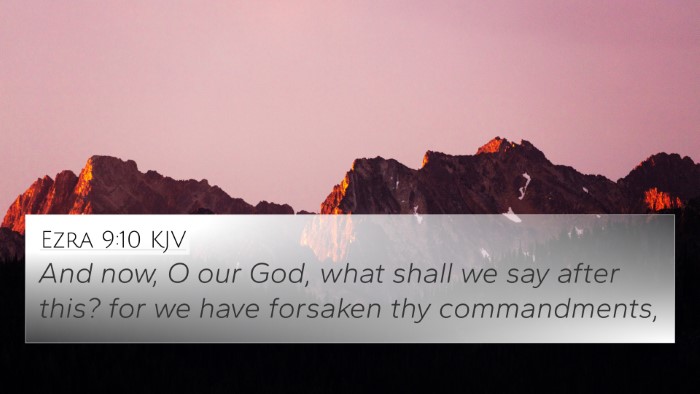Understanding Joshua 7:8
Joshua 7:8 states: "O Lord, what shall I say, when Israel turneth their backs before their enemies?" This verse reflects a moment of distress for Joshua as he confronts a significant defeat after the sin of Achan. The rich insights from public domain commentaries shed light on the implications of this profound question.
Commentary Insights
-
Matthew Henry emphasizes the gravity of the situation. He notes that Joshua is seeking guidance after a setback, showing a leader's responsibility to understand the reasons behind Israel's failure in battle. This cry to God showcases his faith and need for divine insight.
-
Albert Barnes points out the dual aspect of Joshua's plea: first, it reflects his concern for his own leadership, and second, it expresses a deeper anguish for Israel's plight. He highlights how this moment encapsulates the struggle between divine favor and human error, emphasizing the need for repentance and seeking God’s will.
-
Adam Clarke comments on the accountability of Israel's actions. He underscores how Joshua, despite being a faithful leader, finds himself before a seemingly impossible situation caused by the collective sin of the nation. Clarke stresses that the failure to obey God's commands led to a loss of strength against their enemies.
Thematic Connections
This verse ties into significant Biblical themes such as leadership, divine guidance, and the importance of obedience to God's commands. It can be linked to several other verses, offering a broader view of its implications:
- 1 Chronicles 10:13-14 - Discusses King Saul's failure and how God abandoned him because of his disobedience.
- Proverbs 3:5-6 - Encourages leaning on God's understanding rather than human wisdom.
- Psalm 51:1-4 - David’s plea for mercy after his sin reflects a similar need for forgiveness and restoration.
- Hebrews 12:1-2 - Exhorts believers to lay aside weight and sin, paralleling the need for the Israelites to remove sin from their camp.
- Acts 5:1-10 - The story of Ananias and Sapphira demonstrates the seriousness of sin within the community of believers.
- Galatians 6:7 - Reminds us that God is not mocked; we will reap what we sow, highlighting the consequence of sin.
- Matthew 5:14-16 - Calls believers to be a light to the world, which was lost due to Israel's sin in this passage.
- James 1:5 - Encourages asking God for wisdom, akin to Joshua's petition for guidance in adversity.
- Isaiah 59:1-2 - Speaks to the separation caused by sin between God and His people, similar to Israel's distress.
- Revelation 3:19 - Encourages repentance, illustrating God’s desire for restoration even after failure.
Practical Application
The inquiry made by Joshua in this verse is a model for prayer during challenging times. It exemplifies the leaders’ duty to seek God's will amid crises and acknowledge the communal responsibility regarding sin. Believers today can draw from this moment by:
- Understanding the seriousness of sin and its communal impact.
- Recognizing the importance of bringing concerns to God in prayer.
- Seeking God’s guidance and wisdom when facing overwhelming challenges.
- Learning from history as documented in scripture about the consequences of disobedience.
- Encouraging accountability within the community of faith.
The Importance of Cross-Referencing
Cross-referencing Bible verses like Joshua 7:8 plays a crucial role in deepening understanding of scripture. It allows for:
- Comparative Bible verse analysis - Examining similar themes in different contexts increases comprehension.
- Identifying connections between the Old and New Testaments - Understanding how principles transcend time enhances biblical interpretation.
- Bible cross-reference guide - Provides a structured approach for studying interconnected themes throughout scripture.
- Utilizing tools for Bible cross-referencing - Such tools assist in navigating scripture more efficiently, unveiling deeper meanings.
- Enhancing sermon preparation - Cross-referenced themes aid in the development of more impactful messages.
Conclusion
In conclusion, Joshua 7:8 is not merely a cry of despair; it serves as a turning point for understanding leadership, accountability, and divine communication. By applying cross-referencing techniques, one can appreciate the interconnected nature of scripture, fostering a richer understanding of God’s Word.





